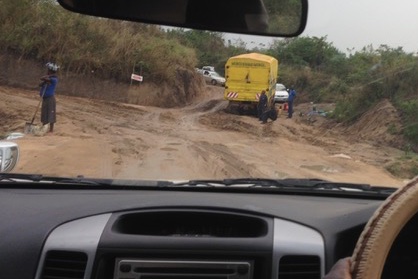When countries threatened airport and border closures, the Canadian government urged its citizens to return to Canada without delay. We had workers who went for short term and some who only had short-term visas. The best option was to get home sooner rather than later – but it was easier said than done. Here are a couple of their action-packed stories.
Travel in Congo
For several months each year, Drs. Philip and Nancy Wood teach at and bring practical support to a Christian hospital and nursing college at Bunia, North East Congo. When they heard news that the Canadian government was urging its citizens to return home, Philip and Nancy prepared to leave earlier than planned. Their Congolese colleagues disapproved of them taking the closest overland routes to Uganda because of rebel uprisings in the area, so they opted to leave from Nyankunde. This required taking a taxi to Nyankunde, where an MAF (Missionary Aviation Fellowship) plane would be
leaving the following morning for Burasi, a border airstrip.
Since there are only 6 kms of paved roads around Bunia, the hot, dark tarmac soon became a dry, dusty road, which serpentined through grasslands for another 45 kms. Because of ongoing bridge construction, a huge truck became stuck in the mud and blocked the road. Taxi drivers coming from the opposite direction pushed their gas pedals to the floor to fight for the one-lane track that bypassed the truck. The whole situation seemed daunting. The taxi Philip and Nancy were in had to jump into the middle of the fray at speed going up a hill on a wet road, and around a bend at the top. If they had met an oncoming taxi . . . well thankfully, they didn’t. Early the next morning, they were on their 15-minute flight.
Philip and Nancy were heading to Entebbe, Uganda, in order to catch a flight that night that they had booked earlier for Amsterdam. They still had to cross the Semiliki River to enter Uganda. A 19-year-old in t-shirt and jeans stamped their passports on his knee to show that they had left Congo. Philip and Nancy hefted their bags and walked the one km to the river. A wooden flat-bottomed rowboat without oars or seats was ready to take them across. “Do you see crocodiles in this river?” Philip asked the owner of the frail vessel. “Yes”, he replied, “We see around ten every day.” A strong current carried them to the north with a bank still to climb – no dock. They quickly scrambled up the embankment, happy not to have encountered the crocodiles. In a mud hut, a Ugandan official stamped their passports, took their $50 US each for a visa, and a car was waiting to drive them to Entebbe. Two car rides and nine hours later, they arrived at Entebbe airport only to discover that their flight had been cancelled! In answer to prayer, another flight became available that same evening, this time to Brussels with an ongoing connection to Newark, New Jersey, which they discovered was not allowed. Arriving in Brussels, they found 22 people ahead of them on standby to Montreal. Once again, the Lord moved on their behalf and another flight was booked for four hours later to Toronto via London. Philip says, “The Lord really looked after us and there was confirmation that we should have left when we did. The day after our departure, the president of Congo closed all colleges and universities – our focus of ministry.” (Philip and Nancy have served with WEC for 47 years, as doctors to Congo and from 1992 to 2002 as leaders of the Canadian Branch of WEC. They are in their seventies and still going strong.)

